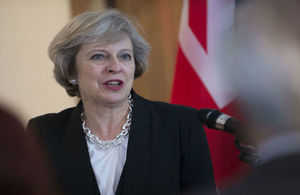PM's conference speech suggests control of immigration will be a red line when exiting the EU
In her first Conservative party conference speech as Prime Minster, Theresa May yesterday spelt out her intention to invoke Article 50 and begin Britain's exit from the EU no later than the end of March next year.
 Image credit: UK GovernmentThe Telegraph noted that May made clear in her speech that border controls are a red line in the Brexit negotiations. The Guardian said that May's speech suggested that regaining control of immigration was more important than access to the single market.
Image credit: UK GovernmentThe Telegraph noted that May made clear in her speech that border controls are a red line in the Brexit negotiations. The Guardian said that May's speech suggested that regaining control of immigration was more important than access to the single market.
According to the Independent, a group of Conservative MPs and activists, the Conservative Group for Europe, vowed to be the resistance to what it dubbed the "harsh Brexit" now apparently planned by May. Conservative MP Neil Carmichael was quoted as saying: "We must avoid, at all costs, a Brexit that damages our economy, damages our capacity as a nation to perform capably in the future and actually damages Europe."
While May's speech did not focus heavily on immigration, when mentioned, it was in the context of control. May emphasised that she wanted the UK to be free to "decide for ourselves how we control immigration" once it had exited the EU.
The Prime Minster said that Britain would leave the EU to become a "fully-independent, sovereign country" and this meant it would not "give up control of immigration again."
May also said that a soon to be introduced 'Great Repeal Bill' will remove the European Communities Act from the statute book.
As BBC News noted, the bill will enshrine all existing EU law into British law and will enable Parliament to amend and cancel any unwanted legislation and also end the jurisdiction of the European Court of Justice in the UK.
"Our laws will be made not in Brussels but in Westminster. The judges interpreting those laws will sit not in Luxembourg but in courts in this country. The authority of EU law in Britain will end," May said.
The section of May's speech with the most mention of immigration is excerpted below (the full speech is here):
"Whether people like it or not, the country voted to leave the EU. And that means we are going to leave the EU. We are going to be a fully-independent, sovereign country, a country that is no longer part of a political union with supranational institutions that can override national parliaments and courts. And that means we are going, once more, to have the freedom to make our own decisions on a whole host of different matters, from how we label our food to the way in which we choose to control immigration.
So the process we are about to begin is not about negotiating all of our sovereignty away again. It is not going to be about any of those matters over which the country has just voted to regain control. It is not, therefore, a negotiation to establish a relationship anything like the one we have had for the last forty years or more. So it is not going to a "Norway model". It's not going to be a "Switzerland model". It is going to be an agreement between an independent, sovereign United Kingdom and the European Union.
I know some people ask about the "trade-off" between controlling immigration and trading with Europe. But that is the wrong way of looking at things. We have voted to leave the European Union and become a fully-independent, sovereign country. We will do what independent, sovereign countries do. We will decide for ourselves how we control immigration. And we will be free to pass our own laws.
But we will seek the best deal possible as we negotiate a new agreement with the European Union. I want that deal to reflect the kind of mature, cooperative relationship that close friends and allies enjoy. I want it to include cooperation on law enforcement and counter-terrorism work. I want it to involve free trade, in goods and services. I want it to give British companies the maximum freedom to trade with and operate in the Single Market – and let European businesses do the same here. But let me be clear. We are not leaving the European Union only to give up control of immigration again. And we are not leaving only to return to the jurisdiction of the European Court of Justice."